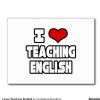|
ESL Forum:
Techniques and methods
in Language Teaching
Games, activities
and teaching ideas
Grammar and
Linguistics
Teaching material
Concerning
worksheets
Concerning
powerpoints
Concerning online
exercises
Make suggestions,
report errors
Ask for help
Message board
|
ESL forum >
Make suggestions, report errors > Phonetic Symbols
Phonetic Symbols
|

Zora

|
Phonetic Symbols
|
As a native and a person who had to learn a second (and a third language). I just don�t understand the "need" for teaching students these symbols. Most of them have never seen them in their life and clearly have no idea what they sound like - Hell, I don�t know what they sound like unless I see them transcribed beside a word... and English dictionaries use these symbols all the time - (also, I noticed that if you take a dictionary from Canada or the US, the phonetic symbols are different - as well as easier to understand and use - than in an English to whatever language dictionary... )
Anyhow, I think teachers should be using the system that I have seen used by many travel companies that sell these little (and quite wonderful) "useful" phrases guide books. Where they write the word as it is said in your own language.
Example:
eye - (I)
boulder - (bowl-der)
This is tons more useful than making kids learn symbols that sadly they are probably never going to use. And it�s way easier for them since people automatically like to relate to things they know and understand.
Or at least, that�s the way I see things...
|
30 Dec 2008
|
|
|
|
|
|

AlbertoPN

|
|
I DON�T AGREE WITH YOU! but, I can i�understand what you say!
I think everybody knows how important is to know phonetic and phonetic symbols... as you say/write it�s very boring to learn phonetics... for example I didn�t learn till the University, but it�s very important for not native English (in this case) speakers to learn phonetics because if you know it you get a very good pronunciation and it�s the difference between somebody understand you or not; for example, the difference between "ship" and "chip" is the first consonat and if you don�t pronounce well these consonants (ch and sh) the people who is talking with you don�t know if you are talking of a "boat" or a component for personal computers, for example. What about "sheep" and "ship"? If you don�t pronounce well the long "i:" perhaps somebody can understand you
that you sail on an animal instead of a boat...
Perhaps you can tell me that these examples are very extreme and all depends of the context of the speech... I know, but with these and other examples you can appreciate how important is phonetics!
And what about vocal cords? You know that very young learners cannot pronounce well (take a child five years old and say him/her to say number "three"... he/she can�t say it because his/her vocal cords are not well prepare)... If you teach them and you encourage them to learn the phonetics symbols you are training their vocal cords!
Now, the question is: how to teach phonetics in a funny and useful way? I use the Phonetics Chart of Adrian Underhill (Sounds Foundation) of McMillan Heinemann and I teach phonetics to very young learners (3, 4, 5, 6, 7, 8, 9 years old) in a very funny way because it�s a game... they do "karate" while they are learning phonetics and they adore the method/game and they learn phonetics as the same time. I do very short sessions of a quarter an hour with them and they adore "karete".
I don�t know if now you are agree with me but let me think that now you can think phonetics in a different way.
Best wishes,
Alberto |
30 Dec 2008
|
|
|

GIOVANNI

|
|
I also see things the way you do Zora. I have been teaching adults for many years and I have always relied on the traveler�s guide. I tried teaching adults through symbols and found it was much easier for them to write the word as it is said. That is the technique I have been using with students. When I had to learn a third language I used the traveler�s guide instead of symbols. It worked for me.
|
30 Dec 2008
|
|
|

goodnesses

|
Hi, you native speakers.
If you as native speakers are talking the sort, what about we Algerian teachers and pupils?
Yes, in Algeria (EFL and not ESL) too, we are obliged to teach and learn phonetic symbols and transcriptions and many other things related to it.
What you point out Zora has always been our conviction (Algerian teachers). I think it is, at least, a waste of time if not another way to annoy the kids more. There teachers too, since most of them have to teach something that they don�t really master and that is, let�s say it frankly, useless as far as learning English or any other foreign language in secondary schools (age 15-17) is concerned. As you said it there are many other (funny and enjoyable) ways to learn pronunciation if that were the purpose.
We know that many of them will never have to use these symbols or be in need of them.
The very minority of them who are going to specialize in studying languages will have plenty of time and more adequate means to learn these and all that concern pronunciation when they get to Uni.
Now I am assured I was not the only one with this point of view.
Thank Cheezels for pointing that WS. It is very interesting.
Regards.
|
30 Dec 2008
|
|
|

EvaRamos

|
|
Hello Guys!
Regarding the issue of phonetic symbols, I used them with my B.A. students because they are going to be English teachers, and they need to understand how sounds are produce and be able to understand dictionary transcription. With the little kids, I don�t use them because, they are too complicated for them. I only use the word and pictures, to help them with the meaning. I don�t use traveler�s guide�s type of pronunciation, because they get distracted by the way it is pronounced, and they forget about how is really written. I think with young students we have to find ways to help students make connections with the words and their pronunciation, without using things that may distract them.
Just an opinion.
Have a nice day!
Eva |
30 Dec 2008
|
|
|

alien boy

|
Hi all!
I tend to agree with Zora about the relevance of these symbols to ESL students... BUT... I am studying linguistics & find the IPA symbols (& other similar symbols) to be very useful from an analytical, theoretical & practical teaching perspective. These symbols provide standards that can be used when comparing notes with other linguists & language professionals in the same way that mathematics symbols (or the periodic table in chemistry) can be used in theoretical discussion to cross language barriers.
So, a lot comes down to the requirements of the students. If the students are learning phonological aspects of language in addition to phonetics, then the IPA & APA are essential to learn in order to have internationally accepted/understood/consistent analytical & descriptive tools.
I find all the comments & perspectives here to be very interesting though!
Cheers, B-)
|
30 Dec 2008
|
|
|

Tere-arg

|
Hi,
I think native speakers and non-native teachers disagree on this topic just because we -non-native- "need" the closest sound to the original which many times does not exist in our mother tongue.
There is a need to represent those sounds accurately and phonetics is the way.
For native teachers, association may work but not for learners of ESL who are not in touch with the language being learned.
Cheers 
|
30 Dec 2008
|
|
|

chorima

|
|
I mostly agree with Tere-arg and Alberto PN. I think there is a clear difference when the English teacher is native or not. Besides, I want my students to be autonomous learners. This means that if they need to look up a new word in a dictionary, they can find both the meaning and the way it is pronounced. Thus, I encourage my students to recognize the phonetic symbols rather than to use them (that , I think, would be part of any specific course, university,....). Of course, the dictionaries should be all using the same symbols.
Anyway, I find all your opinions on this issue very interesting (some food for thought)
Cheers |
30 Dec 2008
|
|
|

frenchfrog

|
|
Phonetics symbols are useful sometimes. Otherwise you end up speaking like this:
|
30 Dec 2008
|
|
|

Mietz

|
|
I teach quite a bit of pronunciation with German "spelling", but when I learned English in Scotland I relied on my dictionary and the phonetic standards in there quite a lot, so I think it�s useful to be able to make sense of them. I don�t overdo teaching them, but I do introduce them. Probably that is my non-native point of view though.
|
30 Dec 2008
|
|
1
2
3
Next >
|